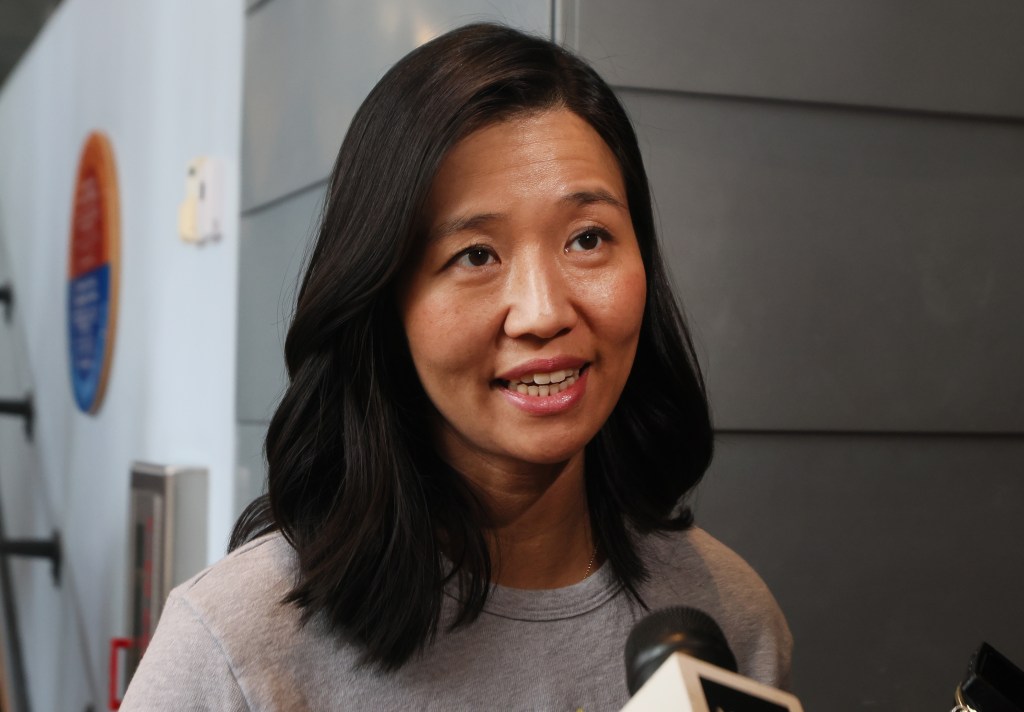
Mayor Michelle Wu rolled out an “emergency law” that would allow Boston to begin increasing property taxes on businesses beyond the state limit next year, saying that residents could otherwise face much higher taxes driven by a steady decline in commercial values.
The mayor’s home rule petition, if approved by the City Council and state lawmakers, would provide a statewide option allowing municipalities to shift more of the tax burden from residents to businesses, exceeding the state cap of 175% up to 200% in the next fiscal year that begins July 1.
The new tax rates would be based on property valuations from Jan. 1, 2024, assessments of which are not expected to be completed by the city until the fall with the impact first felt in tax bills that would go out in January 2025.
In making her pitch, Wu cited the city budget’s heavy reliance on property taxes, which contribute three-quarters of annual revenue, most of which comes from commercial property. The breakdown is particularly cumbersome today, given the empty office buildings and declining values that are steadily eroding Boston’s commercial tax base, she said.
“What we are trying to avoid here is a sudden dramatic and concentrated shock to residential property owners, which could hurt residents and businesses alike,” Wu said during a Thursday press briefing on her new proposal.
Wu’s home rule petition mirrors what was proposed by former Mayor Thomas Menino in late 2003 and signed into law in January 2004 by Gov. Mitt Romney, in that it would provide a tiered shift of the commercial rate — from up to 200% of the residential rate in fiscal year 2025, 197% in FY26, 190% in FY27, and 183% in FY28 before returning the standard state limit of 175% in FY29.
The differences lie in the timing of the petition, which seeks to avoid the confusion of property tax bills that went out in 2004 without reflecting the new rates approved by the state, and a three-year opt-in period that allows Boston and other municipalities the ability to wait to implement tax classification changes.
The mayor said the city would only begin implementing higher tax rates on businesses next year if “an anticipated loss” in commercial values occurs. She noted that the scenario is likely, citing the “signs” that point to that continued trend, which, per a recent report, could lead to a more than $1 billion budget shortfall in five years.
Without legislative intervention, Wu said those declining commercial values could lead to “significantly” higher taxes for homeowners, but her administration said the lack of completed assessments made it impossible to determine what that exact increase could be.
The mayor’s spokesperson, Ricardo Patròn, said the administration was using the reported scenario from 2004 as an example of how the higher tax classification shift could impact property taxes.
Without the change that year, residents were facing a roughly 35% increase in taxes, while commercial property owners would have seen a decrease between 15-20%. Shifting more of the burden onto businesses resulted in a 15-18% residential tax increase, while commercial taxes decreased by 5-8%, Patròn said.
Today’s figures would be dependent, in part, on data showing what’s going on with the commercial market, in terms of sales, vacancies, and business income, Nicholas Ariniello, the city’s assessing commissioner told the Herald.
The city is not considering budget cuts to offset any residential property tax increases, should the mayor’s proposal fail to receive local and state approval, Ariniello said, saying the impact to municipal services would be too great.
While the mayor’s team loaded up the day’s press call with supportive voices from the business community, the proposal has already prompted criticism around plans for businesses with higher taxes while the commercial sector is struggling.
When tax rates are raised on commercial properties, “that further depresses the value of those properties which are already in distress,” Evan Horowitz, executive director of The Center for State Policy Analysis at Tufts University, said Tuesday.
“So over the long term, with approximate values going down, we actually collect less in future property taxes as well,” Horowitz said. “There are much more efficient ways to raise taxes and in general you want to raise taxes from healthy factors and healthy industries that can withstand the additional costs.”
The Boston Municipal Research Bureau raised concerns as well, saying in a Thursday statement that with “the City of Boston’s heavy reliance on commercial tax revenue to fund its operating budget, there is a risk of creating too great a burden on these taxpayers.”
Wu and others on the call insisted that the proposal is not intended to “harm” businesses and is a “non-revenue”-generating measure, but the mayor did note that the larger effort has to be around tackling the city budget’s structural problem of being overly reliant on property taxes, to reduce the burden on taxpayers.
The city would have to petition the state before introducing an additional tax, the mayor said, noting that while there are a number of revenue-generating local options being kicked around at the state level, Boston has been focused on lobbying for a real estate transfer fee — in the form of a 2% tax on big-ticket sales over $2 million that has faced resistance from industry groups.


